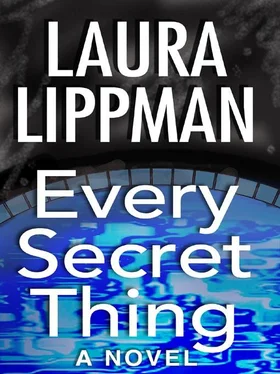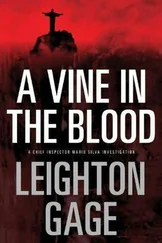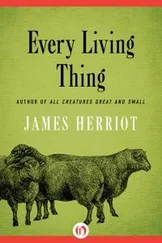“Maybe she thought the woman was a baby-sitter or something. I will say Maveen Little was pretty convincing, stupid as she is. Her story stayed constant, late as we talked to her last night. Hey, you ever date a black man?”
Now it was Nancy ’s turn to follow Infante’s twist of thought. “Just because her boyfriend is black, and her baby’s father is black, doesn’t mean she dates only black men.”
“I bet she does. It’s a type, you see it all the time, especially in South and Southwest Baltimore. What’s that about, anyway-white girls who date only black guys? I never got that.”
“I don’t know.”
“So did you ever date a black guy?”
“I’ve been with Andy since I was in high school. I barely dated anyone .”
“Yeah, but would you? Like…Denzel Washington. Would you go out with him? I mean, not him, because hell, I’d probably bend over for him, rich and good-looking as he is. But say there’s a guy in, I don’t know, Auto Theft, and he’s attractive and nice and treats women right. Would you go out with him?”
“I’m married, remember?”
“But if you weren’t. C’mon, play with me, Nancy. Would you date a black guy under those circumstances?”
“Yeah, sure.” Actually, she didn’t think she would, although she would never rule it out. Her taste happened to run to blond men, men like the Polish boys she had known all her life, a Daddy thing.
“I’d love to go out with a black girl.”
“I thought your thing was redheads.”
“I’m-what’s the word-inclusive.”
Nancy had to laugh at that. Infante’s candor about his weaknesses made them easy to forgive. He didn’t pretend to be anyone other than who he was.
She wished she could say as much about herself.
The sun was setting when they got back to the office. The longest day of the year had come and gone, but the days were still plenty long, and a case like this offered no natural stopping point. Sometimes, going home was a form of discipline, a way of admitting you were only human, needing sleep and food. But who would leave work, much less sleep, when a girl was missing? They had put out the Amber Alert this morning, and Lenhardt had told them the commissioner wanted to launch a search if they didn’t have any solid leads in twenty-four hours. The only question was where would they search, how could they establish a grid? In the area around the mall, the area around Ronnie Fuller’s home?
Or the site of the old crime, the place where Olivia Barnes had been killed.
Leakin Park, taunted a voice in Nancy ’s head, a voice she had been shouting down all day. You’re going to have to go back to Leakin Park . It was a cool, detached voice, one she had begun hearing more and more as she advanced in the department. She thought of the voice as an older, wiser self, visiting from the future. Sometimes she wished the voice would tell her everything it knew. Other times she just wanted it to go away, leave her alone.
Besides, the Chicken Man’s house surely was long gone. It had been decrepit seven years ago, and the trail project should have meant its demise. Or the Barnes family had made sure that the shack was bulldozed. That sad, broken-down place wasn’t the kind of memorial anyone wanted for their child.
Infante’s pager went off in the parking lot and he looked down. “Weird,” he said. “It’s coming from inside the building, from the switchboard.”
They walked into the lobby and the desk attendant looked up, not at all surprised by the synchronicity that brought the two detectives into view seconds after they had been paged.
“These ladies,” the attendant said through the perforations in the Plexiglas, “are here to see you.”
Infante and Nancy turned and realized that the two women sitting in the lobby were Helen Manning, who looked different in her street clothes, and a hulking, almost obese woman in a pink T-shirt and brightly printed stretch pants that were being forced to live up to their name.
“I’m Alice,” the fat woman said, “and I want to help you any way I can.”
Mira Jenkins sat in the downtown office of the Beacon-Light on another ho-hum Saturday night, trying to figure out exactly when newspapers had decided they preferred nothing to happen. She had come in for her weekly night shift determined as always, happy to spin straw into gold if that’s what she needed to get a byline in the next day’s paper. But the day cop reporter had been lamentably efficient, scooping up the overnight array of misdemeanor murders and fatal auto accidents and transforming them into briefs. Mira was left with nothing but condition checks on those who hadn’t been considerate enough to die by 5 P.M.
Now, with 10 P.M. fast approaching, she wouldn’t be allowed to leave the office for anything short of World War Whatever-defined as a multiple murder in a bad neighborhood or a single homicide in a good one-because the night editor couldn’t authorize overtime or hold the pages without the managing editor’s go-ahead. Plus, she had to be in the office to watch the ten o’clock and the eleven o’clock news, because the one thing the television stations did better than the paper was jump on stories from the scanner.
Even then she wasn’t guaranteed a byline. Some weekends the editor might dismiss even multiples as briefs, depending on the demographics. But there had also been Saturday nights when Mira was sent out to horrible neighborhoods for rinky-dink two-alarms with no bodies, just because some flashy image in the video had caught the executive editor’s eye.
Her one crucial responsibility, or so she was informed when she started the Saturday shift, was the 8 P.M. dinner run. The night editor, who otherwise kept her on a short leash, would juggle anything to make sure she was free to do that chore.
“You can pick,” he had said, fanning the take-out menus in front of her. “Chinese, pizza, Japanese. You go, you pick.”
“Why do I have to get your dinner at all? Because I’m the girl?”
“Oh, settle down, Gloria Steinem,” he said. He was that out of it, he actually said Gloria Steinem. “Night cops gets dinner. Ask anyone. Ask rewrite. Ask the guy who did this job before you. This is a godforsaken neighborhood after 6 P.M. on Saturday. We have to brown-bag it or send someone out. Wear your beeper.”
The last admonition was unnecessary. Mira always wore her beeper. She had arrived at the paper with one, an accessory not commonly needed by a neighborhood reporter in the county bureau. It had been her expectation that the suburban assignment would last six, maybe nine months at the most. But she was still stuck in the county seventeen months later, watching newer and less worthy reporters get the call downtown. All because of one mistake, a mistake that could happen to anyone, a mistake that wasn’t entirely her fault.
Yet Mira was perhaps the one person at the paper who didn’t blame her situation entirely on That Story, as it was known in news-room shorthand. Mira blamed her name.
“It’s Mira with an i,” she sang into the phone almost every day. “M-i-r-a, Mira.” The confusion was entirely her own fault, for she had been born Myra with a y and decided upon entering college to revise herself by just one letter. Myra was an old lady’s name, whereas Mira had a certain glamour to it.
The unexpected consequence was that she went through life correcting people upon first meeting. “No, it’s Mira, long i . Not Meer-a. Not like the actress.” She should have gone whole hog, changed the pronunciation along with the spelling, but that had seemed like a bigger mistruth. That was Mira’s word for the white lies of which she availed herself no more often than anyone else. Mistruths.
Читать дальше












